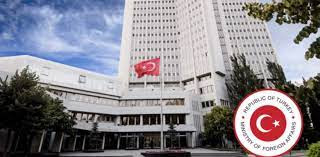The Turkish embassy in Luxembourg has been spying on citizens, gathering intelligence about them at the request of security services. The profiling documents were sent to Ankara by Mehmet Haluk Ilıcak, the Turkish ambassador to Luxembourg between 2016 and 2018.
Turkey's foreign ministry have been sending lists of profiled Turkish nationals to the Ankara Chief Public Prosecutor’s Office, the national police and Turkey’s intelligence agency MIT for further administrative or legal action, the punishment of their relatives back in Turkey and the seizure of their assets.
Judicial documents have confirmed that three Turkish nationals had been profiled by Turkish diplomats and reported to the Foreign Ministry in Ankara. The information was later used in a criminal indictment for a charge of terrorism by a Turkish prosecutor.
The Foreign Ministry intelligence documents used in several indictments was seen as blatant abuse of the criminal justice system by the authoritarian government as part of its crackdown on critics, opponents and dissidents who had nothing at all to do with terrorism.
Some of the accused were jailed for months and even years in some cases without formal charges, an indictment or a trial. It also shows how unlawful information gathering by Turkish Embassy was incorporated in the mass persecution of critics back in Turkey.
Turkish embassies are also spying on citizens who have registered for consular services. A leaked official document stamped secret, showed that the Turkish Embassy in Kosovo profiled 78 people who had listed their professions as teachers when they made applications with the consulate for various citizen services.
Similar work has apparently been done in other Turkish diplomatic missions at the request of the Security General Directorate (Emniyet), the main law enforcement agency in Turkey, which was politicized with a mass purge of some 30,000 officers from the police force.
Moreover, Nordic Monitor revealed how MIT infiltrated refugee camps in Greece in order to spy on opponents who were forced to flee to Greece to escape an unprecedented crackdown in neighboring Turkey.
Critics of the Erdogan government abroad, especially members of Gulen movement, have been facing surveillance, harassment, death threats and abduction since President Erdogan decided to scapegoat the group for his own legal troubles.
They have often been denied consular services such as power of attorney and birth registry as well as having their passports revoked. Their assets in Turkey are seized and their family members at home risk criminal charges.
Foreign Minister Mevlüt Çavuşoğlu confirmed systematic spying on Turkish government critics on foreign soil by Turkish diplomatic missions in February 2020.
Çavuşoğlu said Turkish diplomats assigned to embassies and consulates have officially been instructed by the government to conduct such activities abroad.




















No comments:
Post a Comment